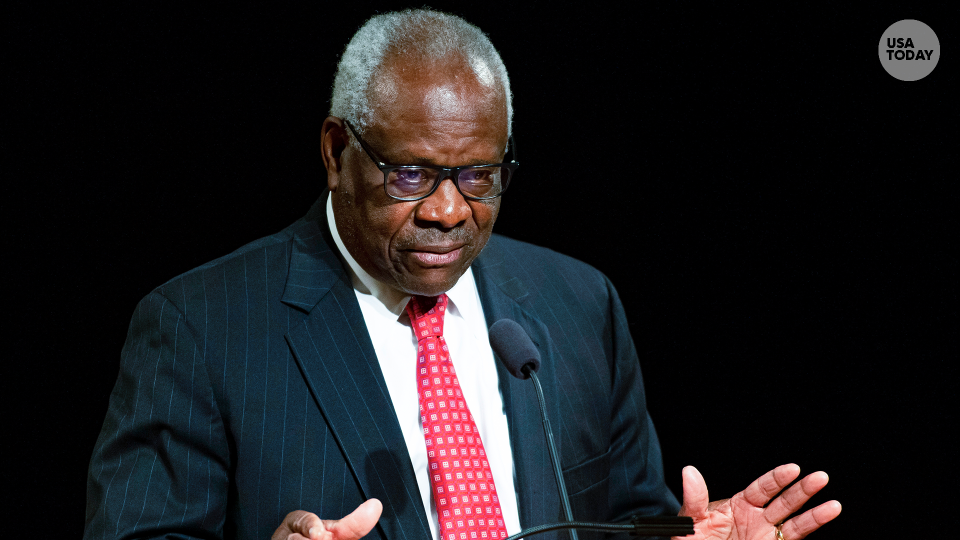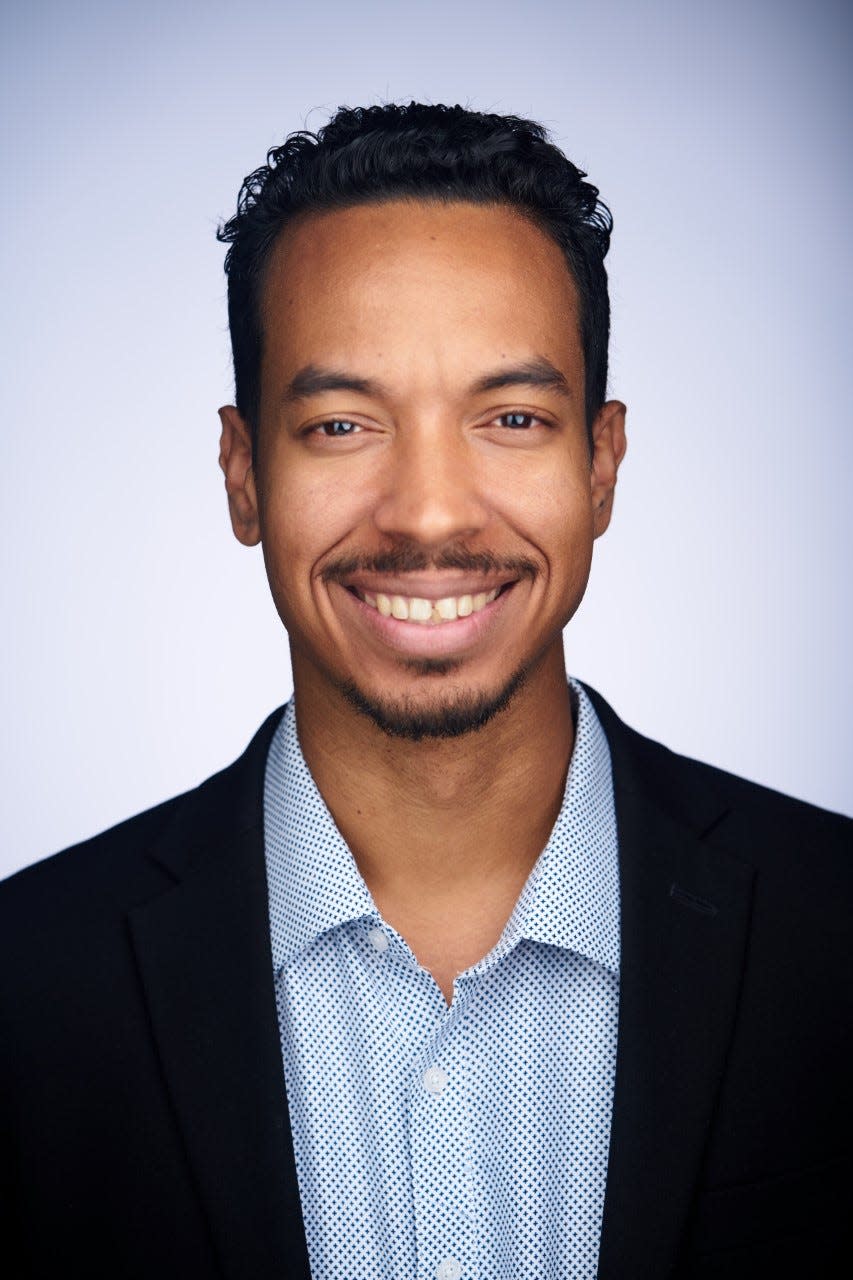Clarence Thomas joked about his friend Harlan Crow a year ago. Now, no one is laughing.
- Oops!Something went wrong.Please try again later.
- Oops!Something went wrong.Please try again later.
I recently asked veteran journalist and media entrepreneur Tavis Smiley about the Supreme Court's decision to end affirmative action in university admissions.
Smiley, founder of KBLA in Los Angeles, on which I have a show, didn't hold back, especially in his criticism of Justice Clarence Thomas.
“I am beyond troubled that a Supreme Court justice who used affirmative action to get into Yale would then pull the ladder up for others," Smiley said on stage this month during a discussion of racial issues and political polarization at Braver Angels' national convention in Gettysburg, Pennsylvania. "It is reprehensible. It is … undemocratic. I think it’s un-American. And I think more than anything else it’s hypocritical.”
As one of two African Americans on the Supreme Court, and perhaps the most conservative justice, Thomas’ position on affirmative action has triggered predictable outrage. But it's not the only criticism he has earned of late, and now Thomas' actions have cast doubt on the legitimacy of the nation's highest court during a time of deep public distrust in American institutions.
The Clarence Thomas I met was friendly and cheerful
I met the justice last year in Dallas at the Old Parkland Conference, produced by the American Enterprise Institute and leading Black conservatives from across the United States. I was aware of past controversies involving Thomas, including Anita Hill's accusation in the 1990s of sexual harassment, but I didn't have strong opinions about the justice or his work.
Given his austere image, however, I did have a sense that Thomas was essentially inaccessible. More stone and statue than flesh and blood.

On that score, my assumptions about the justice were quickly disabused at the conference.
Seeing the familiar face of an academic seated at a table near the entrance to the dining hall, I strode forward to shake the person's hand.
Then I heard a voice say, “Why don’t you introduce yourself?” and I turned around to be greeted by the open arms and the gregarious laughter of every uncle I’ve ever met at a family barbecue.
“Heyyy young man!” Justice Thomas exclaimed, pulling me into a vigorous and cheerful handshake.
“Justice Thomas!” I said, shaking off my surprise and striving to match his energy.
I chatted with the justice for only five minutes, but it took about five seconds for him to feel very familiar to me. His laughter came easily, and he convinced me that whatever else he had become, a part of him was still a down-home brother from Savannah, Georgia.
Will Biden allow Trump to go to prison? US politics is at a danger point.
Before our conversation ended, I made a point of explaining to him what I do for a living, that I represent an organization called Braver Angels, with a mission to depolarize American politics and to heal the American divide.
Thomas grew serious and said: “Good luck.”
Justice Thomas' actions have undermined Supreme Court's image of integrity
Later, during his keynote conversation with University of California-Berkeley law professor John Yoo – who made a point of thanking real estate mogul and philanthropist Harlan Crow, a benefactor of the event and someone Thomas was comfortable making clear was a friend – the justice joked that Crow was someone whose friendship he wouldn't want to lose.
Now, Thomas' friendship with Crow − and the expensive gifts the billionaire has lavished on the justice − is at the center of an ethics scandal that has called into question the integrity of the entire court.
Can SCOTUS justices police themselves? 'Kid glove' treatment of Supreme Court won't find abortion leaker or stop ethics abuses
At the time of last year's conference, however, it was another scandal − the leak of a draft opinion that would eventually overturn Roe v. Wade − that was dominating conversations about the court. The leak was unprecedented and seemed to make clear that even within the the Supreme Court itself, politics had surpassed propriety.
“It’s like kind of an infidelity,” Thomas said in Dallas. “You can explain it, but you can’t undo it.”
Thomas and others at the conference bemoaned the decline of institutional credibility in American life, including with the Supreme Court itself. The leak of the draft opinion followed years of highly contentious and highly politicized confirmation hearings that deepened the public's ire toward the justices, who had earned lifetime appointments to the most powerful court in the nation.
The current scandal involving Thomas is made even more troubling by the public's realization that Supreme Court justices are exempt from the ethical standards and oversight that apply to other public servants. This reality reinforces for many Americans the idea that the elite among us are subject to a different set of rules, a double standard for conduct, than the rest of us. And the public's trust in our judicial system is further eroded, at a time when we can't afford for our institutions to lose any more trust.
Opinion alerts: Get columns from your favorite columnists + expert analysis on top issues, delivered straight to your device through the USA TODAY app. Don't have the app? Download it for free from your app store.
Many Americans no longer trust our nation's leading institutions
At the conference in Dallas last year, Thomas aptly said: “We are in danger of destroying the institutions that are required for a free society. You can’t have a civil society, a free society, without a stable legal system. You can’t have one without stability in things like property, interpretation and impartial judiciary. And I’ve been in this business long enough to know just how fragile it is.”
Clarence Thomas was right then. And it's why Thomas and other justices must be held accountable now.

If Americans lose faith in the Supreme Court as a legitimate institution, the trust we place in it, along with our willingness to submit to decisions we disagree with, might never be restored. And if that should happen, the very legitimacy of the rule of law in America may soon unravel.
John Wood Jr. is a columnist for USA TODAY Opinion. He is national ambassador for Braver Angels, a former nominee for Congress, former vice chairman of the Republican Party of Los Angeles County, musical artist, and a noted writer and speaker on subjects including racial and political reconciliation. Follow him on Twitter: @JohnRWoodJr
You can read diverse opinions from our Board of Contributors and other writers on the Opinion front page, on Twitter @usatodayopinion and in our daily Opinion newsletter. To respond to a column, submit a comment to letters@usatoday.com.
This article originally appeared on USA TODAY: Clarence Thomas' actions undermine integrity of the Supreme Court

